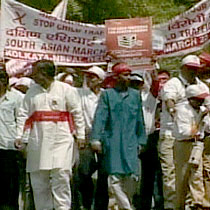2007年VOA标准英语-NGOs Play Larger Role in World Affairs
搜索关注在线英语听力室公众号:tingroom,领取免费英语资料大礼包。
(单词翻译)
By Jela De FranceschiWashington
13 July 2007
Most analysts1 say non-governmental organizations play an important role in world affairs -- ranging from resolving civil conflicts to safeguarding the environment. In Focus, VOA's Jela de Franceschi looks at this growing trend.

Most foreign policy experts refer to leading transnational NGOs as "non-state actors," acknowledging their growing clout2 in the international arena3.
One such organization is Human Rights Watch, the largest human rights monitoring group based in the United States.
 |
| Kenneth Roth |
Human Rights Watch works with partners in 70 countries. In the United States, it monitors issues of race discrimination, and the status of immigrants and prison inmates6.
Roth says the biggest challenge his organization faces is the disrespect for human rights that sometimes accompanies efforts to fight terrorism. "Governments have recognized that if they simply wave the flag of counterterrorism, that that gives them latitude7 to ignore international human rights requirements. The human rights movement is being able [has been able] to push back and insist that respecting human rights is not only the right thing to do in fighting terrorism, but is also the more effective way to go about combating terrorism."
In recent years, economic globalization has given more weight to NGOs dedicated8 to promoting market-oriented reforms.
 |
| John Sullivan |
John Sullivan says CIPE tries to team up with like-minded organizations around the world. "We go to a country and try to find a partner that we can work with. And they are the ones that lay out the agenda of what needs to be done and where the reform process needs to go."
Sullivan says that in an ever-more globalized world, NGOs like his will play increasingly important roles in transferring knowledge and expertise9.
 收听单词发音
收听单词发音 




